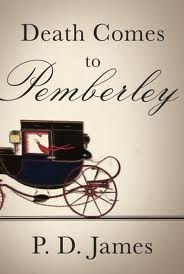Death Comes to Pemberley—P.D. James

They also accused her of being sardonic, and although there was uncertainty about the meaning of the word, they knew that it was not a desirable quality in a woman, being one which gentlemen particularly disliked. (9)
The book opens with a ten page reminder of what we experienced in Pride and Prejudice, although I must say that James infuses the society with a bit more skepticism than I experienced upon reading it.
As James suggests, everyone imagines that Elizabeth was scheming the entirety of her relationship with Darcy in order to catch him. From the very beginning, from the very moment they met, everything she did was carefully calculated in order to marry Darcy in the end. (In the summary, upon journeying to Pemberley with the Gardiners, her aunt and uncle: "...if Miss Elizabeth had entertained any doubts about the wisdom of her scheme to secure Mr. Darcy, the first sight of Pemberley had confirmed her determination to fall in love with him at the first convenient moment." 8) Throughout the book, Elizabeth herself questions it: would she have been as forgiving, as apt to change her mind about someone, if they had not had Darcy's money?
I was immensely and happily surprised at how authentic the dialogue and writing was. P.D. James makes some interesting and thoughtful choices about the well-loved (and some not-so-well-loved) characters that we met in the original P & P. She further develops the history of Wickham, in a completely believable way.
The setting is about six years after the double wedding between the Bingleys and the Darcys. Elizabeth is planning the ball that Darcy's mother started so many years ago. On the eve of the ball, Lydia Wickham (nee Bennett) shows up at Pemberley in a carriage, hysterical that her husband had just been killed in the woods of Pemberley. It turns out, Denny and not Wickham has just been killed. When Darcy and Bingley find the body in the woods, they also find Wickham, covered in blood, admitting that it's his fault. The remainder of the book is spent exploring what actually happens.
Additionally, there are some great moments and lines that James includes in her book. Although I've never really cared for Lady de Bourgh, it does remind me too much of Maggie Smith as the Dowager Countess in Downton Abbey (and, incidentally, my grandmother) when Lady be Bourgh says, "The de Bourghs have never gone in for prolonged dying. People should make up their minds whether to live or to die and do one or the other with the least inconvenience to others." (156) And who doesn't love Maggie Smith in Downton Abbey?
Phenomenal read. And how freakin' adorable is P.D. James?
 And she was born in 1920, as her short bio says at the end of the book. Not bad for a 92-year-old woman!
And she was born in 1920, as her short bio says at the end of the book. Not bad for a 92-year-old woman!


Comments
Post a Comment